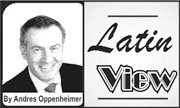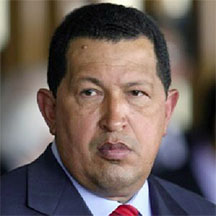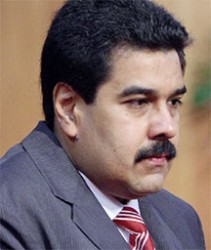The recent history of oil-rich Venezuela should be taught in universities around the world as a textbook case of an economic miracle in reverse: despite having benefited from the biggest oil boom in recent history, the country has managed to be poorer.
 A joint new study by three leading Venezuelan universities — Andres Bello Catholic University, Central University of Venezuela, and Simon Bolivar University — shows that 48.4 per cent of Venezuelan households were below the poverty line in 2014, up from 45 per cent of households in 1998, before late radical leftist President Hugo Chávez took office and benefited from nearly a decade of soaring world oil prices.
A joint new study by three leading Venezuelan universities — Andres Bello Catholic University, Central University of Venezuela, and Simon Bolivar University — shows that 48.4 per cent of Venezuelan households were below the poverty line in 2014, up from 45 per cent of households in 1998, before late radical leftist President Hugo Chávez took office and benefited from nearly a decade of soaring world oil prices.
Luis Pedro España, a Andres Bello Catholic University professor who co-authored the study, told me in a telephone interview that the nationwide survey of 5,400 people was done in October last year, and has a margin of error of 3 percentage points. The survey used the same methodology as a similar study done in 1998 by the government’s office of statistics, which was supervised by a United Nations agency, he said.
The new study is in sharp contrast to Venezuelan government figures, which claim that poverty has decreased in Venezuela under Chávez’s “socialist revolution.”
According to the Venezuelan government’s National Institute of Statistics (INE), the country’s poverty rate has fallen from 44 per cent of households in 1998 to 27.3 per cent of households in 2013, but it has not published any figures for 2014.
The United Nations Economic Commission for Latin America and the Caribbean (ECLAC), which uses official figures from Venezuela, reported recently that poverty in Venezuela — including extreme poverty — rose by nearly 10 percentage points in 2013 after declining steadily in previous years. But ECLAC does not provide figures for 2014, either.

Asked about the disparity between the joint study by the three Venezuelan universities and the INE and ECLAC poverty surveys, España said there has been a “brutal fall of the purchasing power of the Venezuelan people in 2014, which has led growing numbers of them to be unable to buy basic goods and services.” He added that the INE and ECLAC figures do not reflect the record poverty rate because they don’t report figures for 2014.
Venezuela, which relies on oil exports for 96 per cent of its foreign income after Chávez’s “Socialism of the XXI Century” destroyed much of the country’s private sector, has been hit like few other countries by the recent collapse of world prices. After soaring from $9 a barrel when Chávez was elected in 1998 to a record $145 a barrel in 2008, oil prices have fallen to about $45 a barrel this year.
This, and President Nicolás Maduro’s mismanagement, led to an economic collapse in 2014. Venezuela ended the year with a 64 per cent annual inflation rate — the highest in the world — and shortages of milk, toilet paper, and several other basic goods.
“And 2015 looks like it’s going to be even worse,” España says. “All economic indicators show that we are heading toward an inflation rate of 100 per cent or 120 per cent this year, which will be a record in Venezuelan history.”
Maduro blames an alleged conspiracy by the country’s oligarchy and “US imperialism” to wage an “economic war” against the government, and points at new US sanctions “against Venezuela” announced in Washington this week as an example. In fact, the sanctions are not against the country, but against current or former Venezuelan officials involved in corruption or human-rights abuses who will be denied US visas, State Department officials say.
My opinion: It’s hard to recall any case of a country that has received such a windfall in recent history as Venezuela and has ended so poor.
According to Venezuela’s Central Bank figures, the government got $325 billion from oil exports between 1998 and 2008 — more than combined gross domestic product of several Latin American countries.

But instead of investing in education, science, technology, and innovation, or at least building a financial cushion for a rainy day, Chávez embarked on a fiesta or populist subsidies, corruption, and wanton expropriations.
It’s a movie we have seen over and over in Latin America, and that invariable ends badly.
Now, despite Maduro’s daily conspiracy theories that increasingly fewer Venezuelans take seriously, the core of Chávez’s “Socialism of the XXIst Century” — the claim that it has reduced poverty — has collapsed. As the joint study by the three Venezuelan universities shows, it has proven to be a temporary illusion, which lasted only as long as oil prices were at record highs, and that has left the country poorer than ever in recent history.
© The Miami Herald, 2015. Distributed by Tribune Media Services.
